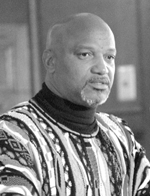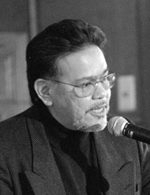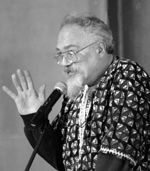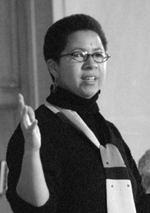The University Record, February 07, 2000 By Jane R. Elgass

Activists with local and national ties encouraged audience members to search their souls for their own values and then pursue their chosen causes by building coalitions and networks.
Panel members speaking at “Radical Revolutionaries: Different Goals, Similar Visions” on Jan. 24 also counseled those attending the program not to be dismayed if not everyone joins in their cause.
“You’re never going to organize everybody. Don’t be self-righteous. You’ve got to educate, become a teacher,” said Carlos Munoz, who founded the first Mexican American studies department in the nation in 1968 at the University of California, Los Angeles, and is the author of books and articles on the Chicano movement.
“You must go beyond black and white, yellow and white. Branch out and put together a stronger group, have representatives in other groups, find a common denominator,” said Munoz, whose work originated with a group of just four other students who didn’t have a name until asked for one by the media. They quickly came up with United Mexican American Students. Noting that “the ’60s weren’t known as the ’60s back then,” Munoz agreed with the other panelists that there are lessons to be learned from those times, but cautioned listeners to not romanticize the period.

“What you need to do today is learn the lessons of the ’60s, early [Martin Luther] King and early Malcolm X, but also go beyond that. You need to work to achieve an authentic multi-racial democracy inclusive of all peoples. You need to fight the ‘isms’ that try to keep us in our place.
“We’re sitting on a powder keg, and you need to seize the time, seize the opportunity to develop political consciousness. We don’t have the luxury of fighting each other or ourselves,” Munoz added.
Other speakers at the program, part of the University’s Martin Luther King Jr. Symposium, were Geronimo Ji Jaga, the California leader of the Black Panthers who was unjustly accused of murder and imprisoned for 25 years; John Sinclair, who founded the White Panther Party and was an active member of the counter-culture revolution of the 1960s and 1970s; and Barbara Ransby, professor of African American studies at the University of Illinois, who was heavily involved in United Coalition Against Racism (UCAR) movement at the U-M in the 1980s.

Sinclair, who holds a degree from U-M-Flint, found it an “irony to be an invited guest” seated in the Union Ballroom when he was forced to hire a lawyer and sue the University to use the ballroom for a fund-raising dance during his early activist days.
A self-described “child of the white middle class,” Sinclair was an undergraduate student as the Civil Rights Movement was gaining momentum. Moved as a child by rhythm and blues music, which he found “powerful and stirring,” he dedicated himself to find out where it came from, to find out more about the African American experience. As an undergraduate, he joined the youth NAACP and the Flint Urban League.
Sinclair urged the audience to “make people aware of economic stratification,” which he sees as the root of most of the problems facing society today.
“White people morally are a pretty vicious lot, and worse as money gets bigger,” Sinclair said. “Look at Detroit, in a continuous depression for 25 years. Many are forced to live by their wits and minutes away we have Plymouth, even Ann Arbor, one of the wealthiest communities.”

Ransby briefly recounted some of the “special” memories her return to the University held for her, citing the several nights she spent in the Fleming Administration Building, as UCAR worked to make the University observe the national holiday commemorating King’s birth, and living in a shanty on the Diag during efforts that opposed apartheid in South Africa.
Drawing on seven years as an activist in Ann Arbor, Ransby encouraged audience members to consider involving the greater community in their causes. “There are some very heroic individuals” in the community, she noted, “with courage and determination. As students, we leave. But the community is an anchor, it provides continuity,” she said.
Ransby said society is facing “a triad of oppression—prisons, poverty, patriarchy. There are two million people in prisons in the United States, she noted, and “we need to take this seriously, to look at who’s populating them. They are disproportionately minority and poor. Prisons have become today’s alms houses,” she said, citing laws against loitering and panhandling “because of the ‘criminalization of the poor’.”
From her perspective, Ransby also sees “a campaign against single Black mothers evidenced in the withdrawal of services.”
“These are contemporary realities,” she said, “and we must understand that the enormous disparity in wealth represents dangers of representational politics, politics of class.”
Ji Jaga was born in the segregated Mississippi Delta region of Louisiana in 1947 and “grew up in Ku Klux Klan country,” forced to “turn the other cheek to our realities of lynchings and dog attacks.”
“There was lynching all around,” he explained, “and we faced a daily struggle against racial evils.” He joined the U.S. Army and served two tours in Vietnam, not through loyalty to his country, but to learn military skills “to prepare people against evil.”
Describing the Black Panther Party, Ji Jaga noted that it was one of several forces in the Civil Rights Movement, a group that thought “King was wrong and Malcolm was right, and that saw its work as a struggle for self-determination for all groups.”
Responding to an audience question on the role of today’s generation, Ji Jaga told his listeners to “govern yourselves” to “watch our for labels. Don’t let others define you.”
“The younger generation,” he added, “has the audacity, the energy. No one can solve your problems other than yourself. Gain control of your destiny and act on it,” he encouraged. “We learned because we acted.”

